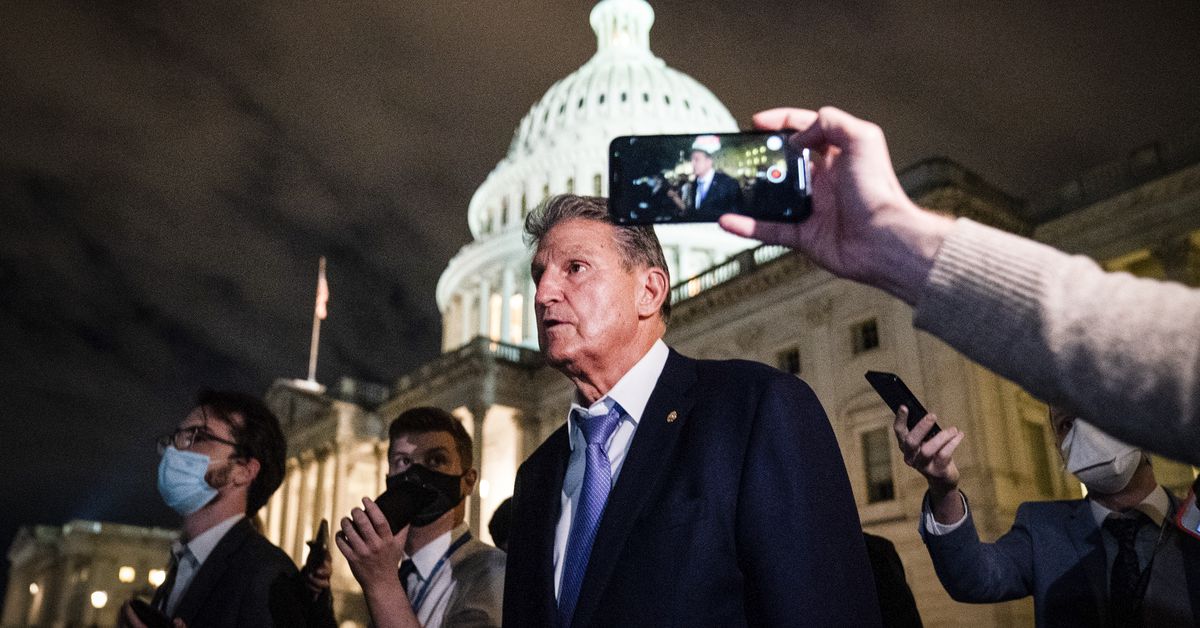The parable of the temperate local weather
After months of discussion and debate, the Democrats are at an impasse on a number of infrastructure laws that could make or break President Joe Biden’s efforts to combat climate change. The gap, as portrayed in myriad news stories, is between progressives who want an ambitious social and climate spending bill and moderates who have protested the price.
But it is a problem to portray this disagreement as a conflict between moderates and progressives. This image ignores the undeniable scientific reality that pollution is warming the planet at an unsustainable and dangerous rate. The catastrophic changes that global emissions are causing to the climate are neither moderate nor debatable. In August, a panel of United Nations climate scientists called it “unequivocal” that humans warmed the sky, water and land of the earth.
“In many areas of politics it is possible to find middle ground; I know because I did, ”said Senator Ed Markey (D-MA), an advocate for rapid climate action, at a recent press conference. “But we can’t compromise on science. There is no middle way between a livable and an uninhabitable world. “
A narrative that pits progressives against moderates risks putting climate deniers in the spotlight and putting fossil fuel interests first. It is well distracts from the content of climate policy, which is already supported by a large group of Americans.
Democratic objectors Sens. Kyrsten Sinema from Arizona and Joe Manchin from West Virginia have disproportionate power over the future of the country’s climate policy. Kent Nishimura / Los Angeles Times via Getty Images
To take ambitious climate action, Senate Democrats must vote every single member of their party (plus two independents) for a version of the Build Back Better agenda, a proposed budget that would, among other things, promote clean energy and reduce US emissions. That put two objectors, Joe Manchin from West Virginia and Kyrsten Sinema from Arizona, at the center of the negotiations, giving them disproportionate power over the future of the country’s climate policy.
Political battles like this show that Americans need a new way to talk about climate change politics since a number of strategists, pollsters and lawmakers told Vox. Instead of focusing on “centrist” or “moderate” politicians, they said political observers should distinguish between the many Democrats who support dealing with the current crisis and the few who support an unacceptable status quo.
“People don’t even know what ‘moderate’ means, especially when it comes to climate change,” Celinda Lake, a Democratic strategist, told Vox. “I mean, you flooded two feet instead of four?”
A traditional left-right spectrum does not find a broad consensus on climate change
Let us consider what climate protection could mean in practice. The planet is standing rampant warming unless the whole world takes aggressive action this decade. Only if countries make large and rapid investments to support clean energy to replace fossil fuels will it be possible to limit warming to less catastrophic levels.
So the difference between doing nothing and separating everything in our power does not stop the crisis. This “moderate” path leads us somewhere between devastating warming and catastrophic warming.
Proponents of humble climate action ignore the scale of the problem, argued Ryan Fitzpatrick, director of climate and energy programs at Third Way, a group that claims to promote center-left politics. “If you don’t publicly acknowledge the severity of the effects of climate change, why should we expect your policy terms or solutions to be based on rationality?” Asked Fitzpatrick.
If one accepts the findings of climate scientists, He added, “You understand the ambition it takes to solve the problem.”
“People don’t even know what ‘moderate’ means, especially when it comes to climate change. I mean, you’re two feet flooded instead of four? ”- Lake Celinda
Research suggests that the so-called moderates in Congress do not hold the middle view of the US on climate change. Anthony Leiserowitz, director of Yale’s climate communications program, has spent his career using surveys to find out what the public actually thinks about climate. When he looks at the political differences between self-proclaimed conservative, moderate and liberal voters, he finds that there is more consensus than could be heard in the halls of Congress.
“The pattern that you really notice is that there is one group that is really not like the others,” said Leiserowitz, “and that is the Conservative Republicans.” This group made up less than a quarter of the respondents. Most US voters who doubt or disapprove of climate change are politically conservative, and most are Republicans, as his research shows.
When he cuts the conservative Republicans as outliers, Leiserowitz finds a surprising amount of agreement on some basic principles, such as the promotion of clean energy. In Yale’s December 2020 national sample of 1,036 Americans, a large majority of Democrats and moderate Republicans supported renewable energy generation on public land. Supporters included 94 percent of Liberal Democrats in the poll, 76 percent of Liberal and moderate Republicans, and 59 percent of Conservative Democrats.
There is also surprising consensus on the importance of switching to fossil fuels. The poll estimates that more than 8 in 10 Democrats across the spectrum support a clean energy transition, as do 59 percent of self-proclaimed moderate and liberal Republicans.
“These are relatively small differences,” Leiserowitz told Vox. In fact, he said, there is more agreement than disagreement about many climate change-related policies, with the exception of conservative Republicans.
climate However, downplayers and deniers have an increased role in politics and arguably distort the public understanding of the consensus position. While some Republicans are gradually moving on to the idea of protecting the climate, Kentucky GOP Chief Senator Mitch McConnell led a Senate Republican majority that ignored the issue for nearly a decade. “We can discuss this forever,” he said in 2014, ignoring the scientific consensus. And when Biden rejoined the Paris Agreement this year, a group of Republican senators tried to override his order.
This helps explain how the future of U.S. climate policy has ended up in the hands of Senator Manchin, a longtime coal businessman who continues to receive campaign funding from the fossil fuel industry and advocate for fossil fuel interests. Before he was labeled moderate, the press named Manchin a conservative Democrat; his goals are very different from Sinema, the other senator widely referred to as moderate in the news these days. Sinema comes from one of the leading states of the solar industry and has publicly spoken out in favor of solid climate spending in the infrastructure law. (She has contradicted reports that she plans to cut $ 100 billion in climate funds from the spending bill.)
As Ezra Klein wrote in a 2015 Vox story about the myth of the middle: “The idea of the moderate middle is nonsense: it’s a rhetorical device to marginalize some political positions at the expense of others.” Climate policy.
What is supposed to replace the myth of the climate moderator?
The time for a moderate approach to the climate is over, argued Dana Johnson, who heads the federal political office of WE ACT for environmental justice, a climate advocacy group. “If we had done that 20, 40, 60 years ago, maybe we could take a moderate approach,” said Johnson. “The moment required us to grow up and be courageous if we were to make any meaningful change.”
She’s not the only one. “Perhaps the most politically difficult aspect of climate change is that after decades of denial and delay, there is no longer a coherent ‘moderate’ position,” wrote energy journalist David Roberts in his newsletter.
At the New Republic, Kate Aronoff has argued that lawmakers who undermine climate legislation are really extremists: “Nobody should call them moderates or even centrists. They are extremists. If they have their way, they will kill a lot of people. “
Instead, it is time to judge politicians by their ambition and the degree to which they prioritize the planet’s climate. Executives unwilling to accelerate the clean energy transition and publicly realizing that fossil fuels may not be the dominant fuel of the future are effectively supporting a dangerous status quo. Politicians who block climate protection are more or less on the same side as fossil fuels.
:no_upscale()/cdn.vox-cdn.com/uploads/chorus_asset/file/22929734/GettyImages_1346211873_copy.jpg)
Climate protesters march towards the White House to urge President Biden to ban fossil fuels on October 12th. Kevin Dietsch / Getty Images
Some climate policies really divide Democrats, such as investing in nuclear power and carbon capture technologies. Many progressive environmentalists are skeptical of both.
A new framing for climate change policy would not ignore these policy debates. It is possible to agree on the reality and urgency of climate change while disagreeing on the best strategies to stop it.
Climate change could still become a major electoral topic as younger voters, more interested in these politics, begin to poll in greater numbers. “Voter turnout will affect a lot of what happens in the midterms,” said Lake, the Democratic strategist. “And in the 2024 election, the younger voters will be bigger than the baby boomers for the first time.”
Republicans could respond to this election pressure. “There are many Republicans who have accepted a tax credit that promotes emissions reductions and clean energy sources,” Carlos Curbelo, a Republican former Congressman who introduced climate legislation in the House of Representatives, told Vox. “It’s a departure from the Republican Party a few years ago, where the most common element was … apathy.”
When it comes to climate change, Republicans and Democrats can be judged by the same yardstick. “It comes down to whether you recognize the generally accepted fact that climate change will wreak havoc, especially if we fail to meet these emissions targets,” said Fitzpatrick of Third Way. “Whether you consider yourself progressive or temperate, if you are serious about the climate, we must all have the same goal. And achieving that means achieving net zero emissions by 2050. “


Comments are closed.